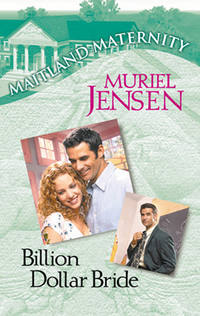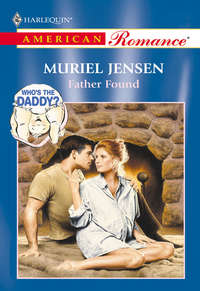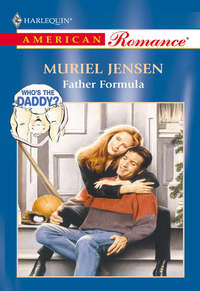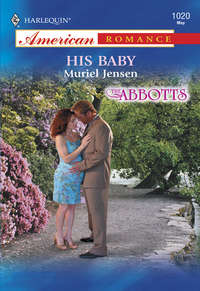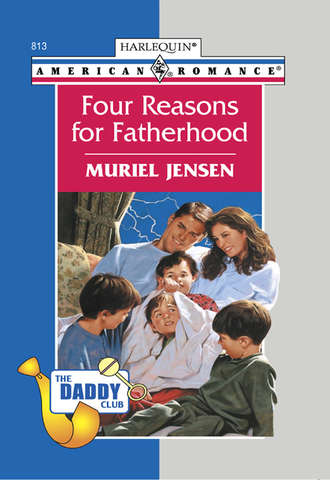
Полная версия
Four Reasons For Fatherhood
Paul took the comb and frowned over it. “Do we have to wait for it to fall out?”
Aaron kept a straight face with difficulty. “No. I’ll snap it off for you.”
He indicated the one at the end, next to the rim. “That one. Then you can still use the comb.”
“Okay.” Aaron snapped off the tooth with the Leatherman tool in his pocket and handed it to Paul. “Got a handkerchief to put it in?”
“No.”
He dug into his pocket again and produced one with a silver monogram. “There you go.”
“All right!” George and John followed Paul upstairs to help with the ritual.
“That was a stroke of genius,” Aaron said to Susan, reaching down to lift Ringo, who’d walked around the table to him.
Susan flexed her stiff arms. “I’ve got a million of those gems tucked away for emergencies. So, you can take care of packing up and selling the house?”
“Sure.” He looked around the modest fifties-era tract home. It was from the togetherness period when rooms ran into one another without doors. The living room, dining room and kitchen were built around a brick fireplace. “You take anything you want. I’ll just close it up for a couple of months until I can come back, look through things and save some stuff for the kids and me. Then I’ll sell it.”
That sounded reasonable. She pointed to the two guitars hanging above the mantel. “Do you think I could have Becky’s guitar? When we were kids she used to con me into singing with her at family picnics, and I can remember swaying with her to the music of that guitar. I know, the kids should have it, but they’ll be with me, anyway.”
“Of course. Take it home with you when you go.” He glanced down at Ringo and smoothed his tiny cowlick. “This little guy’s a cuddler. He walks pretty well, but he certainly seems to prefer lap sitting.”
“I guess even babies get upset when things change, and being held is comforting.”
Aaron nodded. “True. I’ve had moments like that.”
“Yes. So have I.”
Aaron thought he caught a wistful hitch in her voice. He was just beginning to really understand what she was taking on here. “Are you seeing someone?” he asked wondering what this new responsibility might do to a relationship.
“No.” She got up and pushed in her chair. “I meet a lot of men in my line of work, but they’re confused by a woman who can use power tools and carry a four-by-four. And generally, men are uncomfortable with women who confuse them.” She made a rueful face. “At least, I think that’s why I have trouble with relationships. Or it could be I’m just funny-looking or hard to get along with.”
“Well, you’re not funny-looking,” he said.
“Thanks.” She laughed lightly and came around the table to relieve Aaron of Ringo. “I’ve got to get some of the boys’ things packed. I’ll take—”
Ringo began screeching and clutched Aaron’s ears.
Susan stepped back in surprise.
“Whoa! Ouch!” Aaron tried to pry the boy’s fingers off him, but Ringo only screamed louder. “Okay. Let’s change approach,” he shouted at Susan over the protesting screams. “Why don’t I help you pack and bring him along?”
She looked hurt. “I don’t understand. He’s always liked me.”
Aaron rolled his eyes in false modesty. “Oh, I have this irresistible charisma. Sometimes it’s a terrible burden. You’re powerless against it, so don’t try to fight it. If we were going to be in each other’s company long enough, soon you’d be holding on to my ears and screaming, too.”
Her hurt feelings fled as she laughed at that suggestive remark. “A carpenter and computer…” She’d been about to say “nerd,” but Aaron Bradley was as far from a nerd as any man she’d ever met. “Genius?” she finally finished. “I don’t think so.”
He looked surprised. “Why not?”
“We have nothing in common.” She led the way to the stairs and he followed.
“Having things in common is overrated. It pretty much rules out surprises.”
“But surprises can be bad, as well as good.”
“True. But you wouldn’t rule out the good ones to save yourself from the bad ones, would you?”
She thought about that at the top of the stairs while waiting for him. Ringo had wriggled to get down and Aaron was now helping him climb one laborious step at a time.
“If you’re so philosophical about relationships,” she asked, “why aren’t you in one?”
“Takes a lot of time and energy from business,” he said with a frankness she appreciated even as it horrified her. “And I haven’t found anyone who’d make me want to do that.”
“But…” She watched him supporting Ringo’s valiant struggles up the steps and found it paradoxical.
“Do you want your life to be just about business? I mean, I know you have an active social life, but if it’s all just superficial, is there any satisfaction in that? Any fulfillment?”
At the second step from the top he lifted Ringo by his hands and deposited him on the landing. Ringo giggled triumphantly.
“I get those from my work,” he insisted.
She looked up at him in disbelief. “But they’re not the same.
“Fulfillment from success tells you that you’re good at what you do. Personal fulfillment tells you that you have value whatever you do.”
“How do you know that?” he challenged with a grin. “You said you didn’t have a relationship.”
“I’ve observed others. Dave and Becky, for instance.”
He nodded a little grimly. “Yeah, well, Dave and Becky were pretty unique. And I’ll only believe you when you can tell me that from firsthand experience.”
“Susan!” A loud desperate scream came from the direction of John’s and Paul’s room.
Susan ran the short distance to find that someone had opened all the drawers in the highboy dresser, and it was tilting forward, threatening to fall onto the boys, who pushed hard against it.
She shot both hands out to help just as a toy dump truck on the top slid off and hit her in the head.
She struggled to maintain her balance while seeing stars.
“Got it.” Aaron pushed the top two drawers closed and held them while giving the dresser a solid shove that righted it again. John pushed the other drawers closed.
“Wow!” the boy said excitedly. “I didn’t know that would happen.”
“Hey!” Paul held up the truck. The scoop had snapped off. “Susan’s head broke your truck!”
“What did the truck do to you?” Aaron pulled her hand away from the top of her head and a trickle of blood fell onto her forehead and the skin in the V of her blouse.
“She’s bleedy!” George, reported the obvious.
All six of them crowded into the small bathroom while Aaron wet a washcloth and dabbed at the wound. “You have a cut about an inch long,” he said. “But it’s not very deep. I think all it needs is a little antiseptic.”
The boys crowded around Susan, who sat on the edge of the bathtub. She felt like a subject in an operating theater.
“Can you take your hair down?” Aaron asked, turning to the medicine cabinet. “Your hair’s pulled tight and covering part of the cut.”
Susan removed the pins that held her hair up and handed them to Paul, who put them on the counter.
Then Aaron was hovering over her again. He reapplied the washcloth, then put it aside and ran his fingers through the back of her hair, probably to move the strands that covered the cut.
But it had the most surprising effect on her.
It felt wonderful. As though it were happening in an elongated moment, she felt the palm of his hand brush the nape of her neck and the back of her scalp, then his finger burrowing into her hair and threading through it to the ends.
She felt the contact in every root. Sensation rippled over her scalp.
“Does that hurt?” Aaron asked.
“Just…a little,” she said breathlessly.
“Sorry. Here comes the antiseptic. Guys, turn around so you don’t inhale the spray.”
The boys dutifully turned around and Susan covered Ringo’s face with her hand.
“Hold your breath,” Aaron directed, shielding her eyes with his free hand.
He sprayed, the spot stung for moment, and then it was over.
But she retained the memory of his hand in her hair.
Chapter Two
Aaron helped John and Paul pack their clothes and toys, while Susan worked in the younger boys’ room. George was helping Susan, and Ringo was down for a nap.
Though Aaron handled denim and fleece, chambray, woolens, cotton and corduroy, he could still feel the silk of Susan’s hair on the back of his hand.
This is not good, he told himself.
He didn’t know why he’d done it, except that he’d wanted to touch her hair since the first moment he’d seen her in front of the church. The bump to the head had provided him with a good excuse.
He usually allowed himself to have what he wanted because, generally, he didn’t want much. He worked hard, gave himself wholeheartedly to his projects and had discovered early on that giving his employees whatever it took to make them comfortable and happy in their work was ultimately best for all of them.
He’d been terrified all the way over here that he’d hate Becky’s cousin and wouldn’t be willing to leave the boys in her care, despite the will.
But the situation was perfect for him. She was everything the mother of four boys should be. And he thought the fact that she could admit she was a little bit afraid of the future made her seem that much more sane and capable.
All he had to do was see to it that she had everything she and the boys needed materially, and she would do the rest.
This…tug toward her, this fascination with the children he was experiencing were just complex manifestations of grief and guilt.
They didn’t really need him, and he had a new product line coming out in four months. He had a lot of sleepless nights and working weekends ahead of him.
He reasoned with himself all afternoon and had himself convinced by dinnertime.
When he went downstairs with the just-awakened Ringo, he was surprised to find Susan in the kitchen making mashed potatoes. The boys watched television in the living room. Crumbled hamburger meat fried in a pan and smelled wonderful. A can of corn waited on the counter.
“You cook, too?” he asked in surprise.
“Nothing gourmet,” she replied “but yes, a little. Though seldom for myself. Why?”
“I thought maybe a woman who was into power tools wasn’t interested in cooking.”
She smiled at him over her shoulder. “Cooking is just construction with food.” She dipped a spoon into the mashed potatoes and offered it to him. “Enough salt?”
He tasted. “Perfect.”
“It’s just shepherd’s pie, but the boys like it. I made it the night I got here.”
“I opened an account for you at a Princeton bank,” he said abruptly, stepping out of the way as she took an oblong pan from a bottom cabinet.
She put the pan on the counter and turned off the heat under the burners. “What? Why?”
He’d suspected he’d be in for objections. “It gave me something to do in San Francisco while I was waiting for the fog to lift. I took care of it on-line.”
She began layering corn, hamburger and mashed potatoes into the pan. She paused in her work to look up at him as though wondering what had brought this on. Her brown eyes scanned his face.
“I’m able to support the children,” she said calmly. “There’s no reason for you to feel obli—”
“Of course there is,” he interrupted a little more loudly than he’d intended. “They’re my nephews. I want to know that you can keep them in new shoes while they’re growing, that there’ll be enough money for sport or music lessons or whatever they might want to pursue.” He sighed and lowered his voice. “I want to know that you won’t be worn to a nub trying to keep it all together.”
She laughed lightly as she opened the oven door. “I don’t think money can guarantee that, Aaron. But thank you.” She put the casserole in the oven and closed the door.
“Susan,” he said firmly, “I’m doing it.”
“It isn’t necessary.”
“It is to me.”
She set the temperature and the timer, then turned to smile at him. “All right. You do what you have to do.” Then she moved past him to pull place mats out of a drawer.
Frustrated, Aaron abandoned the argument and asked her when she intended to go home.
“Tomorrow,” she said. “At least, I hope so, I’m having a little trouble lining up a truck. But I have a show to film from a room I’m working on at home. You’re welcome to come along if you want to spend a few more days with the boys.”
He nodded. “Thanks. I appreciate that. I can get a hotel. What time is dinner?”
“Half an hour,” she said.
“All right. If you’ll excuse me I have a little business to take care of.”
“Of course.”
He went to his suitcase for his laptop, found a quiet spot and e-mailed the office.
SUSAN SAW INSTANTLY the advantage of having a man at the dinner table. The usual harassment the boys engaged in despite her efforts to guide a civil conversation was quickly squashed by Aaron’s frown of disapproval.
“You always hog the butter!” Paul shouted across the table at John.
“Well you eat like a hog!” John countered, oinking loudly for full effect as he shoved the butter tub at his brother.
Inspired by the oinking, George contributed excitedly, “I can talk like a donkey!” and proudly brayed at high volume.
“Guys,” Susan said quietly, “let’s not do that tonight, all right? Your uncle’s here and I’d like to think that when he goes home, he’ll remember you as having good manners.”
Silence fell at the table. John put down his fork.
“You’re going home?” he asked grimly.
Aaron nodded. “I have to go back to Seattle.”
“Why?” Paul wanted to know.
“Because that’s where my business is,” he replied, looking a little shaken by their obvious distress. “And my home. And my dog.”
George, seated at his right hand, said earnestly, “Susan would let you come live with her. She’s taking all of us to live with her. I bet you could even bring the dog.” He turned to Susan. “Couldn’t he?”
“He can’t bring his business,” Susan explained, “which is why he has to go home. He has a lot of people who work for him and a lot of people who buy things from his company. They need him there to do his work.”
“He could call and tell them where he is,” Paul suggested. “If you can’t go home, you should always call.”
“Right. But this isn’t like just being late for dinner. Thank you, Paul.” Aaron accepted the butter from him. “This is important work. A lot of people depend on me being there to do my job.”
“But I thought you were the boss,” John said. “Doesn’t that mean you can tell other people to do the work and they have to do it or they get fired?”
“A good boss does a lot of the work himself,” Aaron replied. “Or even when other people do it, he sticks around in case there’s a problem and to make sure everything’s getting done in the right way.”
“I know!” Paul shouted, waving both arms in the air. “We can all go with you!”
“But Susan has a job here,” Aaron persisted. Susan could tell he was finding their arguments exhausting.
John sighed. “It’s too bad we couldn’t move New Jersey closer to Seattle.”
Aaron patted his shoulder. “You can all come and visit me at Christmas,” he said. “How would that be?”
“How long till Christmas?” George asked.
“Nine months, give or take a few weeks.”
“That’s how long it takes to have baby,” Paul chimed in. Then added seriously, “Only you can’t do that ’cause you’re a guy.”
“Well, I’m pretty happy about that,” Aaron said with a grinning glance at Susan.
And then for some completely mysterious reason, Paul’s mention of a baby and Susan’s soft brown eyes watching him connected in his brain in a way that made him temporarily breathless, speechless, mindless.
A part of him was thinking that his mind was working like a teenager’s, snatching double entendres out of the air. Another was thinking speculatively, Hmm…
“Your uncle has to go home,” Susan said gently but firmly, “and we have to let him.”
“Why?” John asked simply. “I mean, if we want him to stay with us?”
She obviously didn’t know what to say and looked to him for help.
Aaron was just a little offended by her eagerness to get him out of their lives and let her flounder. It was perverse, he knew, since he kept telling himself he had to get away, but it was the principle of the thing.
“What kind of dog do you have?” Paul asked.
“A Siberian husky.” Aaron reached for his coffee cup and saw that it was empty.
Susan noticed and got up to get the carafe from the warmer.
“Those are the ones with the mask,” John said. “Jared Butler down the street has one.”
George’s eyes widened. “There’s a dog that wears a mask?”
John and Paul groaned while Aaron explained about the Husky’s markings.
Dinner and the conversation about Aaron going with them ended when Ringo, bored with being ignored, threw his plastic bowl from the high chair into the middle of the table. It overturned two glasses of milk and landed with a splat in the mashed potatoes on top of the remaining shepherd’s pie.
All hands were required to clean up.
Susan maintained a militarylike schedule to get the boys in and out of the shower, then scrubbed Ringo in the bathtub. Aaron helped her get everyone to bed.
Ringo and George were asleep before the covers were pulled over them.
“So…where are they exactly?” Paul asked. “My parents, I mean. I know they’re with God, but where is that?”
“In heaven,” John answered. “It’s in the sky.”
“Like…in a plane?”
“No. In the clouds.”
Paul, ever practical, propped up on an elbow, frowning. “But they’d fall out.”
John stared morosely at the ceiling. “They have wings.”
Aaron was tempted to correct the misconception, but wasn’t sure what could replace it. Who knew? And the thought that Dave and Becky had wings and lived in the clouds was somehow comforting.
“Nobody really knows where heaven is,” Susan said simply, quietly, “because nobody can come back to tell us, and if they see that we need anything, they tell God about it.”
“Like if we wanted to move New Jersey closer to Seattle?”
She sat on the edge of Paul’s bed and smoothed his hair. “Like if you wanted to have sweet dreams, and think about happy things like all the fun stuff we’re going to do together.”
John folded his arms pugnaciously atop the covers. “What if we asked them to come back?”
Susan tucked Paul in, then went to John’s bed. “That’s something they can’t do, John. But they’re with us in spirit.”
“That’s not good enough,” he said unequivocally. “I want them back.”
“I know,” she replied gently. “So do I. But you can’t have that.”
“Then I want Uncle Aaron to stay.”
She patted his arm. “We all have to get on with our lives, John. Your uncle has to get on with his, and we have to get on with ours.”
John turned onto his side. “Well, it sucks.”
She leaned down to kiss his cheek. When she stood to leave the room, she looked tired and grim.
Aaron felt even worse than that. He kissed Paul, then John. “I know it doesn’t seem like it now,” he said, “but pretty soon you won’t feel so bad and life will be fun again. I promise.”
The boys gave him the look children give adults when they know they’re being scammed.
“Yeah,” John replied. “Good night, Uncle Aaron.”
SUSAN SHOOK CEREAL into bowls, added milk, sliced bananas, and told herself bracingly that the day couldn’t be too awful. All they had to move was two rooms of furniture—the boys’ bedrooms. Paulette Norris, her producer and Chris Charbon, her neighbor, were coming to help her. How awful could that be?
She didn’t want to think about it. Keeping four little boys out of trouble while heavy furniture was being moved struck terror into her heart. She’d have to leave Paulette or Chris with the boys while she helped the other move. Or maybe their uncle would stay with them. She wasn’t sure just when he intended to return to Seattle. He’d missed the funeral and seen the boys. There was nothing else left for him to do here.
He’d folded the blanket he’d used last night on the sofa and stacked it neatly with the pillow in a corner. He’d apparently left already on some errand he hadn’t shared with her, because he didn’t seem to be in the house. His bag, though, was at the foot of the stairs where he’d left it.
“I don’t want to move,” John said as Susan spooned instant cocoa into a lineup of cups.
She smiled sympathetically at him over her shoulder. “I know you don’t. But most of my television show takes place in the room I’m fixing at my house and it would make things a lot easier for me if I didn’t have to travel across town. I think you’ll like it once you get there.”
“Do you have ponies?” Paul asked.
She shook her head. “No ponies.”
“Dogs?”
“Nope.”
Paul sighed dramatically. “I don’t want to go either.”
George looked woeful. “Are we gonna go today?”
She poured hot water into the cups and stirred. “Yes,” she said. “My friend is going to stay with you while I move all your stuff over, then we’re going to have a pizza party at my house, then you can fix things up in your room however you like.”
George’s lip began to quiver. “But I don’t want to go today. Can’t we go tomorrow?”
She took the handle of two cups in each hand and carried them to the table, wondering what she could do to lighten the mood. Only Ringo happily stuffed cereal into his mouth, unaware that his brothers’ world had crumbled—and that they weren’t too happy with the woman who was trying to reassemble the pieces.
“We have to go today,” she explained gently “because I have a show to do the day after tomorrow and I have a lot to get ready.”
John poked desultorily at his cereal. Paul picked up spoonfuls of milk, then tipped the spoon and dribbled it back into the bowl again.
George began to cry.
A firm rap sounded on the door, followed by Aaron’s arrival in the room. He was wearing jeans and a dark blue sweatshirt that seemed to change the color of his eyes. He was followed by two other men, one of them pushing a furniture dolly.
One of the men Susan recognized as Micah Steadwell, whom Aaron had introduced to her in front of the church.
“Hey guys!” Aaron said to the boys. He smiled at Susan. “I got some help and a truck. We should have the job done in no time. You remember Micah,” he said to Susan.
“Of course.” She returned Micah’s smile. “Good morning.”
Micah drew a tall good-looking man forward. “This is my brother, Ross. Ross, this is Susan Turner, Aaron’s friend.”
The man offered his hand to Susan. He had dark hair and laughter in his eyes. “I’m pleased to meet you. You’re somewhat of a legend at Hardware and Muffins.”
She blinked. “I’m…where?”
“Hardware and Muffins. My parents’ hardware store—my mother runs it alone now. She was inspired one day to put a coffee bar in the back and all of a sudden it’s become the place to be in Princeton.”
“No kidding.” Susan smiled, hoping she didn’t look as confused as she felt. Coffee and books, sure. But coffee and hardware?
He seemed to understand what she was thinking. “Once you meet my mother, you’ll understand,” he said clearly convinced that was true. “She’s unique.”
Micah smiled. “That’s the nice word for it.”
Ross went on. “She has classes for women on working with tools called Hardware for Women. She stocks Legacy, you know. She’s wanted to invite you to come and speak to her group for months, but she was sure you’d be too busy.” He glanced beyond her to the boys, who were watching the adults with a little less despair than they’d shown earlier. “That’s pretty much a certainty now, isn’t it?”
Susan shrugged. She loved talking to women about what she knew best. The critics claimed that her show was so successful because she demonstrated carpentry and fix-it projects for women without talking down to them, while encouraging them to take on bigger and more complicated jobs. She made it seem as though she was having one-on-one dialogue with each woman in her audience.


